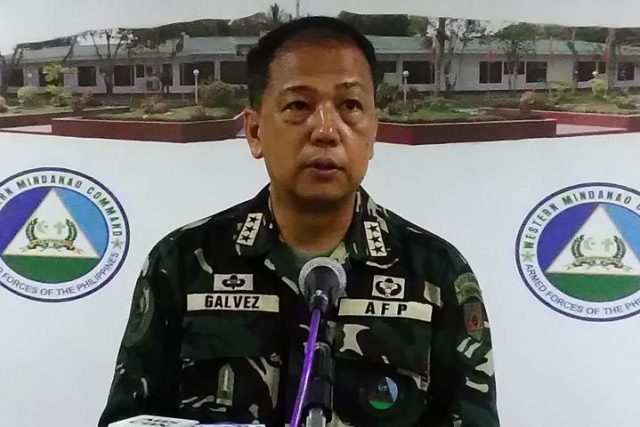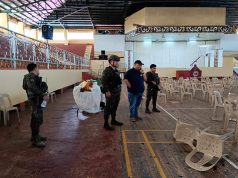MANILA, Philippines — The Armed Forces of the Philippines is keeping an eye on Cotabato City, which it worries might be “the next” Marawi, which government forces retook late October from extremist gunmen after five months of intense fighting that left the Lanao del Sur capital in ruins.
“We’re looking now at the possibility that the next will be Cotabato City,” said Lieutenant General Carlito Galvez Jr., commander of the Western Mindanao Command, at a forum on violent extremism at the Asian Institute of Management on Thursday.
” …If we think of the BBL (Bangsamoro Basic Law) … it will really create some frustration, because the ISIS is looking at the hopelessness as one of the issues, selling point,” he said. “It’s not only the religion, but the feeling of hopelessness and the feeling of frustrations.”
The enactment of the BBL, which would create a new Bangsamoro homeland, is part of the peace agreement forged between the government and the Moro Islamic Liberation Front under the administration of former President Benigno Aquino III.
However, its passage was set aside after the January 2015 Mamasapano incident, in which 44 personnel of the police Special Action Force, 18 MILF fighters, and at least five civilians were killed during firefights that followed a covert mission tto get Malaysian terrorist Zulkifli bin Hir, alias Marwan, in the Maguindanao municipality.
During September’s Legislative-Executive Development Advisory Council meeting, President Rodrigo Duterte certified the new draft BBL as urgent.
Galvez said ISIS is still present in the country and the military is preparing to counter the terror network.
“The danger now is the lone wolf and the pack of wolves (types of attack), wherein we saw it in the U.S. That’s why we are looking at the threat seriously. The President is looking at it very seriously,” he said.
Duterte himself sounded the alarm on Cotabato City in September.
“If things cannot be helped, Cotabato City will explode and there will really be fighting,” the Philippine Star quoted him as saying at the closing ceremony of the Mindanao Business Conference in Cagayan de Oro.
“Cotabato, puputok ‘yan dahil ang isang lote, tatlo ang may-ari (Cotabato will really explode because a plot of land is owned by three people),” he said. “This trouble in Cotabato City forms part of the trouble that is plaguing Mindanao for the longest time.”
“I will tell you now straight that there will be no peace in Mindanao for the longest time,” he added.
Based on “discussions” with present and former members of extremist groups, as well as their family members, The Asia Foundation said it was able to pinpoint likely recruits.
Speaking at the forum, Sam Chittick, Asia Foundation country representative in the Philippines, noted that in mainland Mindanao, recruits are usually college students — persons with an education. In Mindanao’s islands, recruits are young, poor, and have low educational attainment. The latter are also usually relatives of former fighters, and have personally experienced losses from conflict.
Chittick said recruitment is done through social media and shortwave radio channels, family members and student organizations, offers to learn Arabic, and public displays of ISIS flags to project the network’s popularity.
There are also “push and pull factors” which draw them into violent extremism.
UNESCO defines “push factors” as “the conditions that are conducive to violent extremism,” “the broader processes that can ‘push’ individuals towards violent extremist groups.”
“Pull factors,” on the other hand, are “individual motivations that attract potential recruits and the rationales that may be used to legitimize violence.”
Based on The Asia Foundation’s research, push factors are:
- frustration borne out of perceived and actual marginalization of Muslims in Mindanao
- anti-Muslim bias and a sense of persecution
- un-addressed historical injustices
- experiences of human rights violations and a need for revenge
- military operations which are seen as the willful destruction of Muslim communities
- bad governance and bad economics
- frustration with the leadership of the MILF and the Moro National Liberation Front, and with the peace process
Pull factors include the emotional and spiritual appeal of the ideology, and the sense of purpose it offers.
Chittick recommended that governments work with and “through families and mothers” to combat violent extremism; rethink the security sector’s approach; build the capacity of the security sector so it can improve its community and stakeholder engagement; and have positive messaging through religious initiatives, among others.
Francisco Lara, Jr., country manager of one of the world’s leading peace-building organizations, International Alert, also suggested that aside from doing research on communities affected by violent extremism, “communities impervious to violent extremism” — even if they are adjacent to conflict-stricken communities — must be studied as well.










